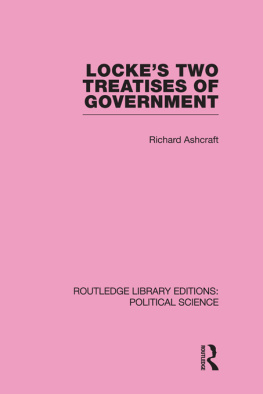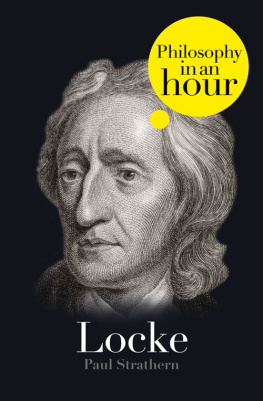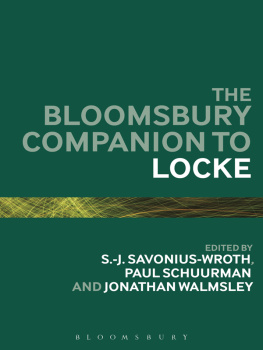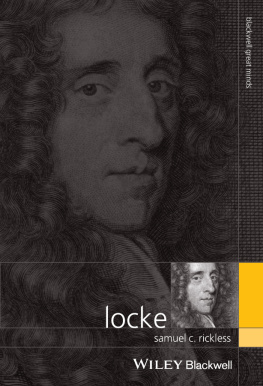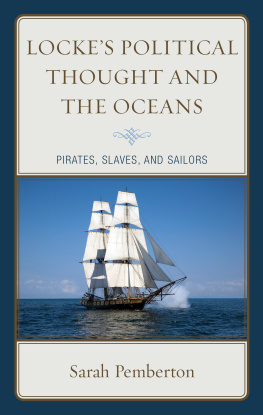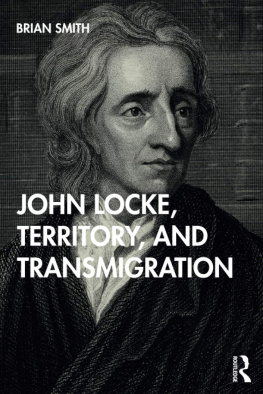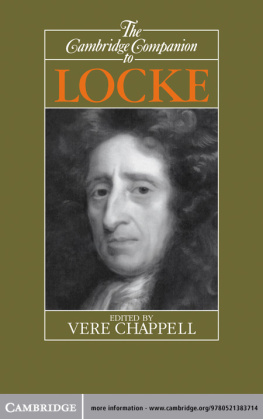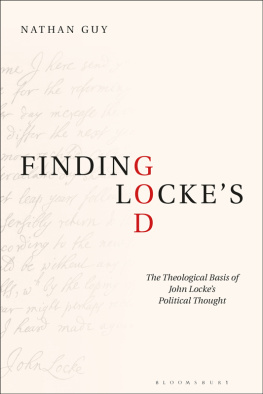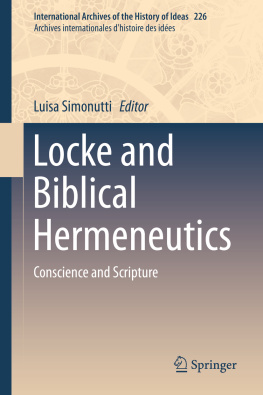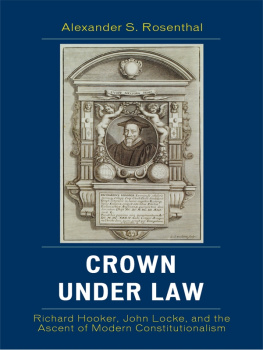ROUTLEDGE LIBRARY EDITIONS: POLITICAL SCIENCE
Lockes Two Treatises of Government
First published 1987
This edition first published in 2010
by Routledge
2 Park Square, Milton Park, Abingdon, Oxon, OX14 4RN
Simultaneously published in the USA and Canada
by Routledge
711 Third Avenue, New York, NY 10017
First issued in paperback 2012
Routledge is an imprint of the Taylor & Francis Group, an informa business
1987 Richard Ashcraft
All rights reserved. No part of this book may be reprinted or reproduced or utilised in any form or by any electronic, mechanical, or other means, now known or hereafter invented, including photocopying and recording, or in any information storage or retrieval system, without permission in writing from the publishers.
British Library Cataloguing in Publication Data
A catalogue record for this book is available from the British Library
ISBN 13: 978-0-415-49111-2 (Set)
Publishers Note
The publisher has gone to great lengths to ensure the quality of this reprint but points out that some imperfections in the original copies may be apparent.
Disclaimer
The publisher has made every effort to trace copyright holders and would welcome correspondence from those they have been unable to trace.
ISBN13: 978-0-415-64978-0 (PBK)
ISBN13: 978-0-415-55552-4 (HBK)
Richard Ashcraft, 1987
This book is copyright under the Berne Convention. No reproduction without permission. All rights reserved.
Allen & Unwin, the academic imprint of
Unwin Hyman Ltd
PO Box 18, Park Lane, Hemel Hempstead, Herts HP2 4TE, UK
40 Museum Street, London WC1A 1LU, UK
37/39 Queen Elizabeth Street, London SEI 2QB
Allen & Unwin, Inc.,
8 Winchester Place, Winchester, Mass. 01890, USA
Allen & Unwin (Australia) Ltd,
8 Napier Street, North Sydney, NSW 2060, Australia
Allen & Unwin (New Zealand) Ltd in association with the Port Nicholson Press Ltd,
Private Bag, Wellington, New Zealand
First published in 1987
British Library Cataloguing in Publication Data
Ashcraft, Richard
Lockes two treatises of government.
(Unwin critical library; 17)
1. Locke, John, 1632-1704
I. Title
192 B1297
ISBN 0048000795
Library of Congress Cataloging-in-Publication Data
Ashcraft, Richard
Lockes two treatises of government.
(Unwin critical library)
Bibliography: p.
Includes index.
1. Locke, John, 1632-1704. Two treatises of
government. I. Title. II. Series.
JC153.L853A84 1987 320 8617293
ISBN 0-04-800079-5 (alk. paper)
Set in 10 on 12 point Plantin by Columns, Caversham, Reading and printed in Great Britain by Billings & Sons Ltd, London and Worcester
Each volume in this series is devoted to a single major text. It is intended for serious students and teachers of literature, and for knowledgeable non-academic readers. It aims to provide a scholarly introduction and a stimulus to critical thought and discussion.
Individual volumes will naturally differ from one another in arrangement and emphasis, but each will normally begin with information on a works literary and intellectual background, and other guidance designed to help the reader to an informed understanding. This is followed by an extended critical discussion of the work itself, and each contributor in the series has been encouraged to present in these sections his own reading of the work, whether or not this is controversial, rather than to attempt a mere consensus. Some volumes, including those on Paradise Lost and Ulysses, vary somewhat from the more usual pattern by entering into substantive critical discussion at the outset, and allowing the necessary background material to emerge at the points where it is felt to arise from the argument in the most useful and relevant way. Each volume also contains a historical survey of the works critical reputation, including an account of the principal lines of approach and areas of controversy, and a selective (but detailed) bibliography.
The hope is that the volumes in this series will be among those which a university teacher would normally recommend for any serious study of a particular text, and that they will also be among the essential secondary texts to be consulted in some scholarly investigations. But the experienced and informed non-academic reader has also been in our minds, and one of our aims has been to provide him with reliable and stimulating works of reference and guidance, embodying the present state of knowledge and opinion in a conveniently accessible form.
C.J.R.
University of Warwick,
December 1979
I want to thank Sage Publications for granting me permission to reprint material from my article, Revolutionary politics and Lockes Two Treatises of Government , Political Theory, vol. 8, no. 4 (November 1980), pp. 429-86. I also want to thank the American Political Science Association for permission to reprint material from my article, Lockes state of nature: historical fact or moral fiction?, American Political Science Review, vol. 52, no. 3 (September 1968), pp. 898-915. Princeton University Press kindly granted me permission to make use of some material from my Revolutionary Politics and Lockes Two Treatises of Government (Princeton, NJ: Princeton University Press, 1986).
I am grateful to the Academic Senate of the University of California at Los Angeles for its assistance in funding the research for this book and to the staff of the William Andrews Clark Memorial Library (UCLA) for their courteous and efficient help in the execution of that research. A special thanks must go to my research assistant, Susan Matthews, whose dedication and perseverance made a valuable contribution to the completion of this project. I am also indebted to the Keeper of Manuscripts of the Library of the Inner Temple, and to the staffs of the Bodleian Library, Oxford, and of the British Library for allowing me to consult manuscripts in their possession.
I am appreciative of the advice and suggestions I received from Ian Shapiro and C. J. Rawson, though the responsibility for whatever errors remain in the text is mine.
Contents
| Works | The Works of John Locke, 12th edn, 9 vols (1824). |
| ELN | Essays on the Law of Nature, ed. W. Von Leyden (Oxford: Clarendon Press, 1954) |
| I:1, 1 | An Essay Concerning Human Understanding, ed. Peter H. Nidditch (Oxford: Clarendon Press, 1975) |
| I, 1 or II, 1 | Two Treatises of Government, ed. Peter Laslett, 2nd edn (Cambridge: Cambridge University Press, 1967) |
| STCE | Some Thoughts Concerning Education, in James L. Axtell (ed.), The Educational Writings of John Locke (Cambridge: Cambridge University Press, 1968) |
| FTG or STG | Two Tracts on Government, ed. Philip Abrams (Cambridge: Cambridge University Press, 1967) |
| Early Draft | An Early Draft of Lockes Essay, ed. R. I. Aaron and Jocelyn Gibb (Oxford: Clarendon Press, 1936) |
| Correspondence | The Correspondence of John Locke, ed. E. S. De Beer, 8 vols (Oxford: Clarendon Press, 1976-85) |
| MS | Locke manuscripts, Bodleian Library, Oxford University |
Thirty years ago, Lockes Two Treatises of Government was viewed as the classic expression of liberal political ideas. It was read as a defence of individualism and of the natural right of individuals to appropriate private property. The Two Treatises , it was argued, stated the fundamental principles of the Whigs, and thus served as an intellectual justification for the Glorious Revolution of 1689. The Two Treatises of Government provided, in short, a general philosophical defence of the rights of property-owners to institute and defend a political system based upon their consent, and a specific historical defence of the actions of the landed gentry and aristocracy in placing William and Mary on the English throne in 1689. Moreover, Lockes work, and especially the Second Treatise, was often characterized as the first secular expression of political theory in the modern era.

